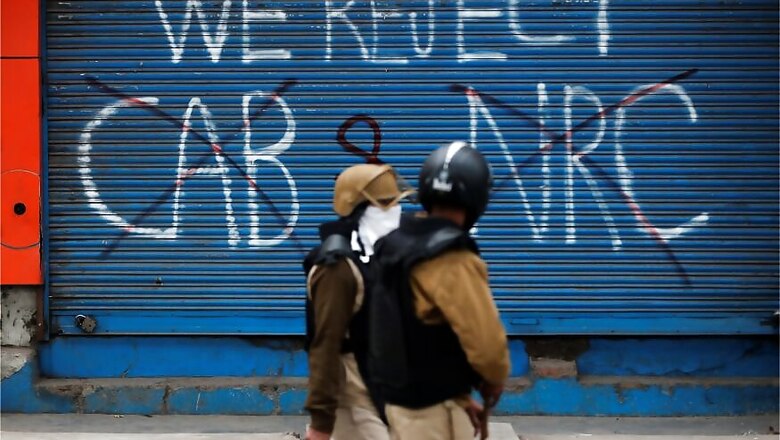
views
On August 11, 1949, Panjabrao Shamrao Deshmukh, the first agriculture minister of India and Congress leader from Maharashtra, argued that an “Indian is a very easily recognisable person” and when combined with domicile it becomes even easier to define.
Deshmukh was debating the fundamental question of who an Indian citizen would be during the Constituent Assembly debates and then, like now, the question of Pakistan loomed large. “I see no reason why Pakistan should be singled out,” he said, objecting to the specification that anyone who migrated to modern-day Pakistan after April 1, 1947 wouldn’t be an Indian citizen.
“It (migrated) means going out of the country with the intention of settling permanently in some other country and not remaining in the country from which he has migrated. If the meaning of the word ‘migrate’ is clear, then nobody who leaves the Indian shoes and goes out — it does not matter whether he goes to Pakistan or Honolulu or the North or the South Pole, he will not be entitled to the citizenship of India.”
Jaspat Roy Kapoor, Raja Sabha member from Uttar Pradesh, described the question of whether someone who had migrated to Pakistan and “transferred his loyalty” from India to Pakistan as a “matter of principle”. But then, did everyone who flee to Pakistan do so with the intention of “permanently settling down there” or did they flee in panic, asked Bihar MP Brajeshwar Prasad. And so it went on.
Eighty years later today, the same debate has engulfed India. As student protests punctuate the nation and the Opposition attacks the BJP government, Prime Minister Narendra Modi argues that the legislation doesn’t impact any citizens of the country, irrespective of their religion. The Prime Minister maintained that “no Indian has anything to worry” regarding the Act. Union Home Minister Amit Shah maintained that this was necessitated because of the partition itself and would effectively correct a historical wrong.
So why aren’t the protesting students or opposition parties convinced? What exactly is the controversy about? Who benefits from the amendment and to what extent? News18 breaks down the issues.
Who exactly is a citizen of India?
As per the Citizenship Act of 1955, there are four ways to obtain citizenship: by birth — anyone born in India between 1987 and 2004 or those born after 2004 to at least one India parent and the other parent not being “illegal”, through registration which is for those who are citizens through marriage or ancestry or through a waiver, given by the union government to an applicant who has rendered distinguished service to science, art, literature, etc.
Finally, citizenship can be obtained through naturalisation, which is the bone of contention in this case. As per Section 6 of the Citizenship Act, a certificate of naturalisation can be given to someone who is not an illegal immigrant and has lived in India for 12 months continuously and in the 14 years before this period, the person has lived in India for at least 11 years. Moreover, a migrant from Pakistan (including modern-day Bangladesh) was granted citizenship if they entered India before July 19, 1948. In Assam, the Assam Accord grants citizenship before 1971.
Who are illegal migrants and can they become citizens?
An illegal immigrant is a foreigner who enters India without valid documents, or overstays their visa or other travel document and can be deported or imprisoned. They are prohibited from acquiring Indian citizenship. But India did not have a specific policy for granting asylum or refugee status to illegal immigrants, religious or otherwise. Instead, the MHA took up the matter on a case-by-case basis and granted either work permits or long-term visas. In September 2015, the Modi government had made changes to Indian laws that allowed non-Muslim illegal immigrants from Pakistan and Bangladesh to stay in India indefinitely.
What has changed with the Citizenship Amendment Act (CAA)?
The new law effectively says that a specific group of illegal immigrants — those who came from Afghanistan, Bangladesh or Pakistan on or before December 31, 2014 and belong to Hindu, Sikh Buddhist, Jain, Parsi, or Christian religious communities — will not be treated as illegal immigrants and will now be eligible for citizenship. It allows a person to apply for citizenship via naturalisation if they need the qualifications pertaining to residency in India — that they be employed in central government service for the past 12 months, or spend 11 of the past 14 years in India. For this group, the residency requirement for naturalisation has been relaxed from 11 years to 5 years.
How many people will benefit now?
It isn’t clear.
Union Home Minister Amit Shah maintained that it would aid “lakhs and crores” of refugees from the three countries. Data that had been given to the Parliament in the MHA in 2016 had identified 2,80,394 "stateless" people in India. But this included Muslims from neighbouring countries like Pakistan and Bangladesh, and also countries that have been left out such as Sri Lanka and Myanmar. Earlier this year, the Intelligence Bureau quoted a figure of 31,313 persons belonging to religious minorities to the Joint Parliamentary Committee (JPC) who had arrived in India facing “religious persecution” before the cut-off date in 2014, and would be the immediate beneficiaries.
The Act also opens up the possibility of giving citizenships to more people from the six religions in the three countries in the future, with relaxed norms — something which was simply not available earlier.
What is the controversy about?
The controversy is not simply about what is in the Act, but what has been left out.
In other words, only certain illegal immigrants have become eligible for citizenship. Muslims, irrespective of nationality or refugees from other neighbouring countries like Sri Lanka or Myanmar haven’t been included. The Statement of Objects and Reasons (SOR) in the Bill makes two clear points, that millions of citizens were once in the same undivided India and secondly that these countries have a state religion that has resulted in persecution. However, it doesn’t explain the inclusion of Afghanistan (which wasn’t a part of undivided India) and the exclusion of Myanmar (part of undivided India). Nor does it take into account that Sri Lanka has a state religion of Buddhism and Myanmar gives primacy to Buddhism. So the Act does not help persecuted groups like Rohingya Muslims in Myanmar, Tamils in Sri Lanka, Shia or Ahmadiya Muslims in Pakistan, or Tajiks or Uzbeks in Taliban. Legal experts have argued that the provision distinguishing between groups violates the standard of equality that Article 14 of the Constitution guarantees — unless reasonable rationale for doing so can be articulated.
The Opposition has argued that the BJP’s rationale behind the Bill doesn’t ring true. Instead, it effectively underscores their politics of seeing the country as a ‘Hindu rashtra’.
Are the protests in the northeast different?
The protests in the north-east are distinct in the sense that they are not driven due to those who are excluded, but how many have been included. The Act has reignited longstanding fears about the arrival of more migrants, irrespective of religion or nationality, which would lead to changes in demography.
In Assam, for instance, where migration, demographic changes, sub-nationalism has driven politics since the days of the Assam movement (1979-85), old fears of culture, language being sidelined and extra pressure on scant land resources and jobs have returned. In Assam, protesters have said that CAA violates the Assam Accord that had set the cut-off date as March 24, 1971 for Indian citizenship.
How is the Citizenship Amendment Act (CAA) linked to the National Register of Citizens and why is there fear among Muslims?
The National Register of Citizens was conducted from 2015 to 2019 in Assam on the orders of the Supreme Court with the explicit aim of identifying illegal immigrants. It initially received support from the BJP but backtracked after the eventual list was dominated by Hindus. The BJP, in response, said that it would push the CAA as a solution and said that this would allow Hindus left from the initial list to claim citizenship. The combination of a promised nationwide NRC and the creation of a potential window for non-Muslims not on the NRC list to apply for citizenship has led to the fear that it would only be Muslims who could lose their citizenship.



















Comments
0 comment